Research Report: Occupational Stress and Resilience in ICU Nurses
VerifiedAdded on 2023/01/19
|12
|4105
|65
Report
AI Summary
This report delves into the critical issue of occupational stress among ICU nurses, aiming to define the factors contributing to this stress and explore effective resilience strategies. The study employs a qualitative research design, specifically utilizing a phenomenological methodology to gather in-depth insights into the lived experiences of ICU nurses. Data collection methods include both primary and secondary sources, with a focus on semi-structured interviews to allow participants to express their experiences fully. The research questions address the causes of occupational stress, the nature of workplace well-being for ICU nurses, the impact of stress on their well-being, and the specific strategies employed to cope with stress. The report also outlines the research paradigm, including a pragmatic approach and an inductive approach, and discusses the ontological and epistemological perspectives, such as critical realism and positivism. The findings aim to contribute to a better understanding of the challenges faced by ICU nurses and to inform the development of interventions to promote their well-being and enhance patient care. Simple random sampling is proposed to select 200 participants for quantitative data collection, with the use of SPSS for analysis. The research will provide valuable insights into the stressors faced by ICU nurses and effective strategies for managing them, ultimately contributing to improved healthcare outcomes.
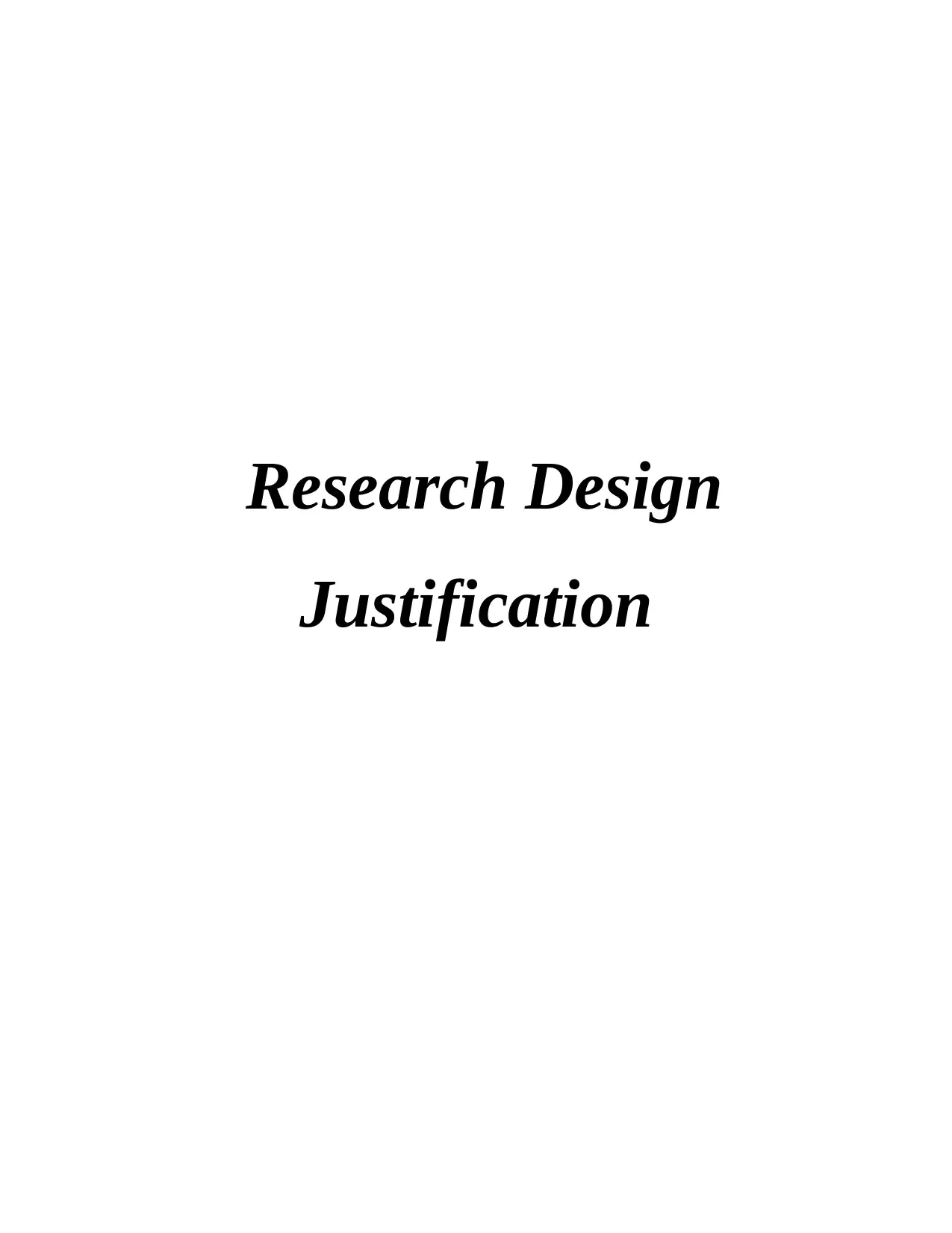
Research Design
Justification
Justification
Paraphrase This Document
Need a fresh take? Get an instant paraphrase of this document with our AI Paraphraser
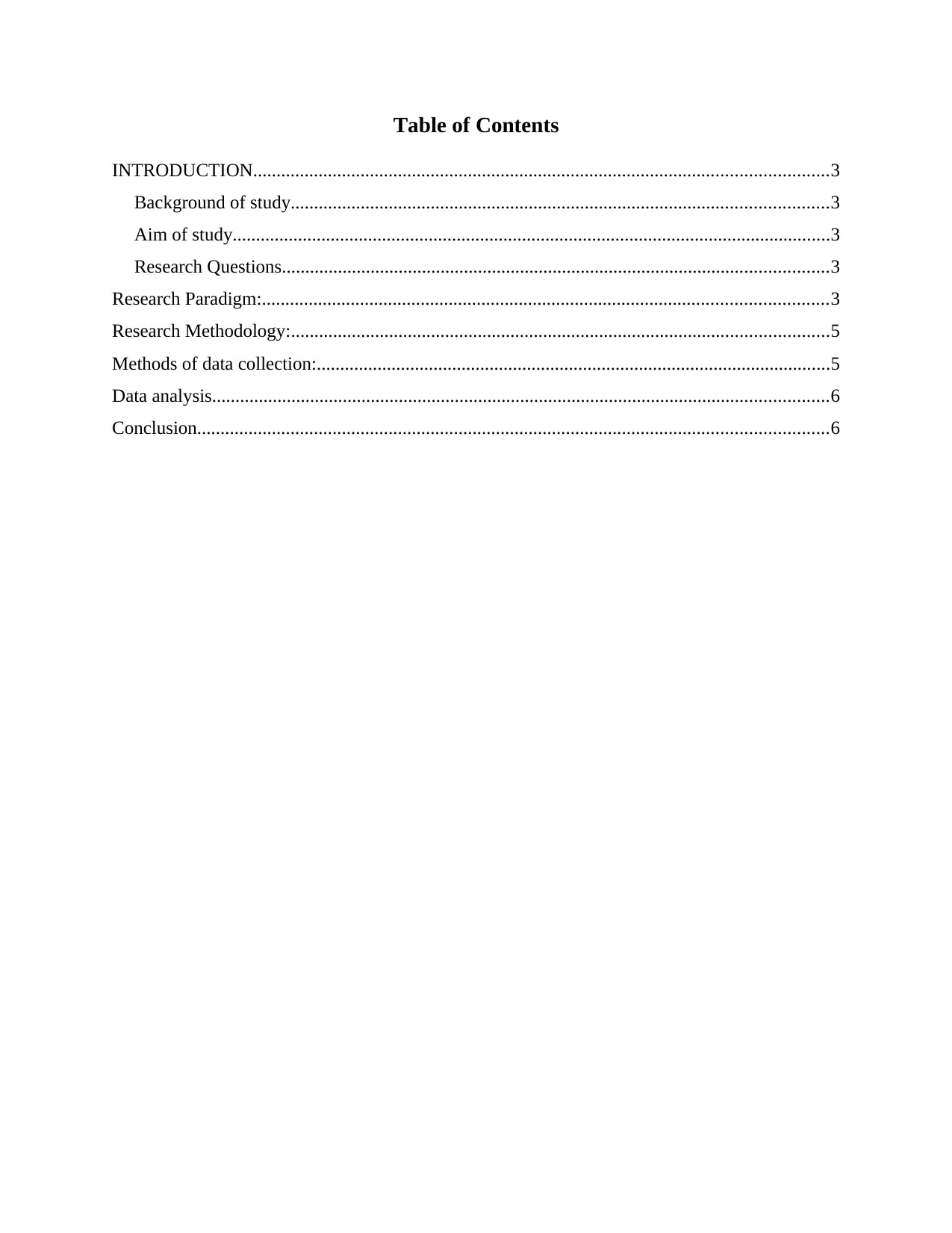
Table of Contents
INTRODUCTION...........................................................................................................................3
Background of study...................................................................................................................3
Aim of study................................................................................................................................3
Research Questions.....................................................................................................................3
Research Paradigm:.........................................................................................................................3
Research Methodology:...................................................................................................................5
Methods of data collection:..............................................................................................................5
Data analysis....................................................................................................................................6
Conclusion.......................................................................................................................................6
INTRODUCTION...........................................................................................................................3
Background of study...................................................................................................................3
Aim of study................................................................................................................................3
Research Questions.....................................................................................................................3
Research Paradigm:.........................................................................................................................3
Research Methodology:...................................................................................................................5
Methods of data collection:..............................................................................................................5
Data analysis....................................................................................................................................6
Conclusion.......................................................................................................................................6
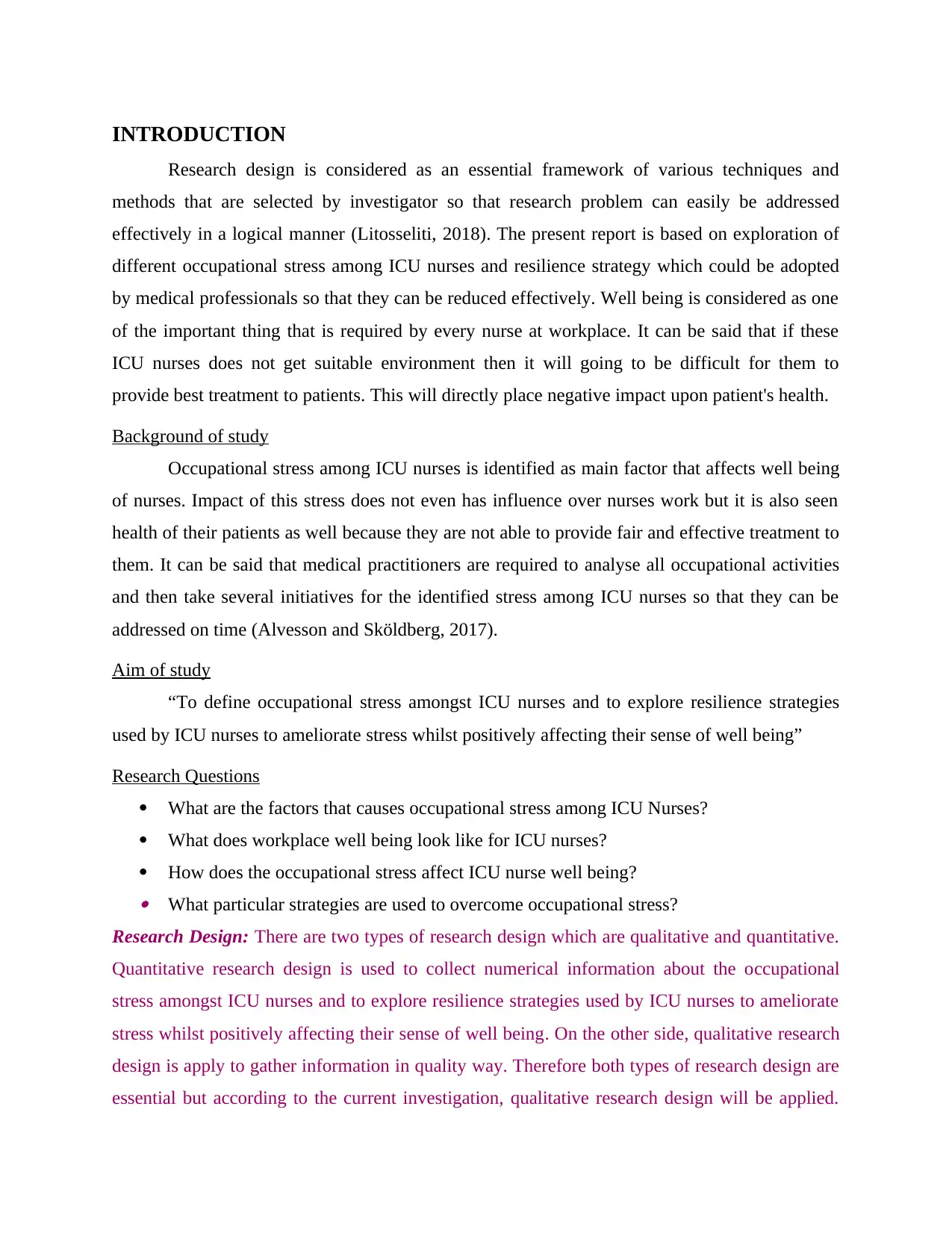
INTRODUCTION
Research design is considered as an essential framework of various techniques and
methods that are selected by investigator so that research problem can easily be addressed
effectively in a logical manner (Litosseliti, 2018). The present report is based on exploration of
different occupational stress among ICU nurses and resilience strategy which could be adopted
by medical professionals so that they can be reduced effectively. Well being is considered as one
of the important thing that is required by every nurse at workplace. It can be said that if these
ICU nurses does not get suitable environment then it will going to be difficult for them to
provide best treatment to patients. This will directly place negative impact upon patient's health.
Background of study
Occupational stress among ICU nurses is identified as main factor that affects well being
of nurses. Impact of this stress does not even has influence over nurses work but it is also seen
health of their patients as well because they are not able to provide fair and effective treatment to
them. It can be said that medical practitioners are required to analyse all occupational activities
and then take several initiatives for the identified stress among ICU nurses so that they can be
addressed on time (Alvesson and Sköldberg, 2017).
Aim of study
“To define occupational stress amongst ICU nurses and to explore resilience strategies
used by ICU nurses to ameliorate stress whilst positively affecting their sense of well being”
Research Questions
What are the factors that causes occupational stress among ICU Nurses?
What does workplace well being look like for ICU nurses?
How does the occupational stress affect ICU nurse well being? What particular strategies are used to overcome occupational stress?
Research Design: There are two types of research design which are qualitative and quantitative.
Quantitative research design is used to collect numerical information about the occupational
stress amongst ICU nurses and to explore resilience strategies used by ICU nurses to ameliorate
stress whilst positively affecting their sense of well being. On the other side, qualitative research
design is apply to gather information in quality way. Therefore both types of research design are
essential but according to the current investigation, qualitative research design will be applied.
Research design is considered as an essential framework of various techniques and
methods that are selected by investigator so that research problem can easily be addressed
effectively in a logical manner (Litosseliti, 2018). The present report is based on exploration of
different occupational stress among ICU nurses and resilience strategy which could be adopted
by medical professionals so that they can be reduced effectively. Well being is considered as one
of the important thing that is required by every nurse at workplace. It can be said that if these
ICU nurses does not get suitable environment then it will going to be difficult for them to
provide best treatment to patients. This will directly place negative impact upon patient's health.
Background of study
Occupational stress among ICU nurses is identified as main factor that affects well being
of nurses. Impact of this stress does not even has influence over nurses work but it is also seen
health of their patients as well because they are not able to provide fair and effective treatment to
them. It can be said that medical practitioners are required to analyse all occupational activities
and then take several initiatives for the identified stress among ICU nurses so that they can be
addressed on time (Alvesson and Sköldberg, 2017).
Aim of study
“To define occupational stress amongst ICU nurses and to explore resilience strategies
used by ICU nurses to ameliorate stress whilst positively affecting their sense of well being”
Research Questions
What are the factors that causes occupational stress among ICU Nurses?
What does workplace well being look like for ICU nurses?
How does the occupational stress affect ICU nurse well being? What particular strategies are used to overcome occupational stress?
Research Design: There are two types of research design which are qualitative and quantitative.
Quantitative research design is used to collect numerical information about the occupational
stress amongst ICU nurses and to explore resilience strategies used by ICU nurses to ameliorate
stress whilst positively affecting their sense of well being. On the other side, qualitative research
design is apply to gather information in quality way. Therefore both types of research design are
essential but according to the current investigation, qualitative research design will be applied.
⊘ This is a preview!⊘
Do you want full access?
Subscribe today to unlock all pages.

Trusted by 1+ million students worldwide
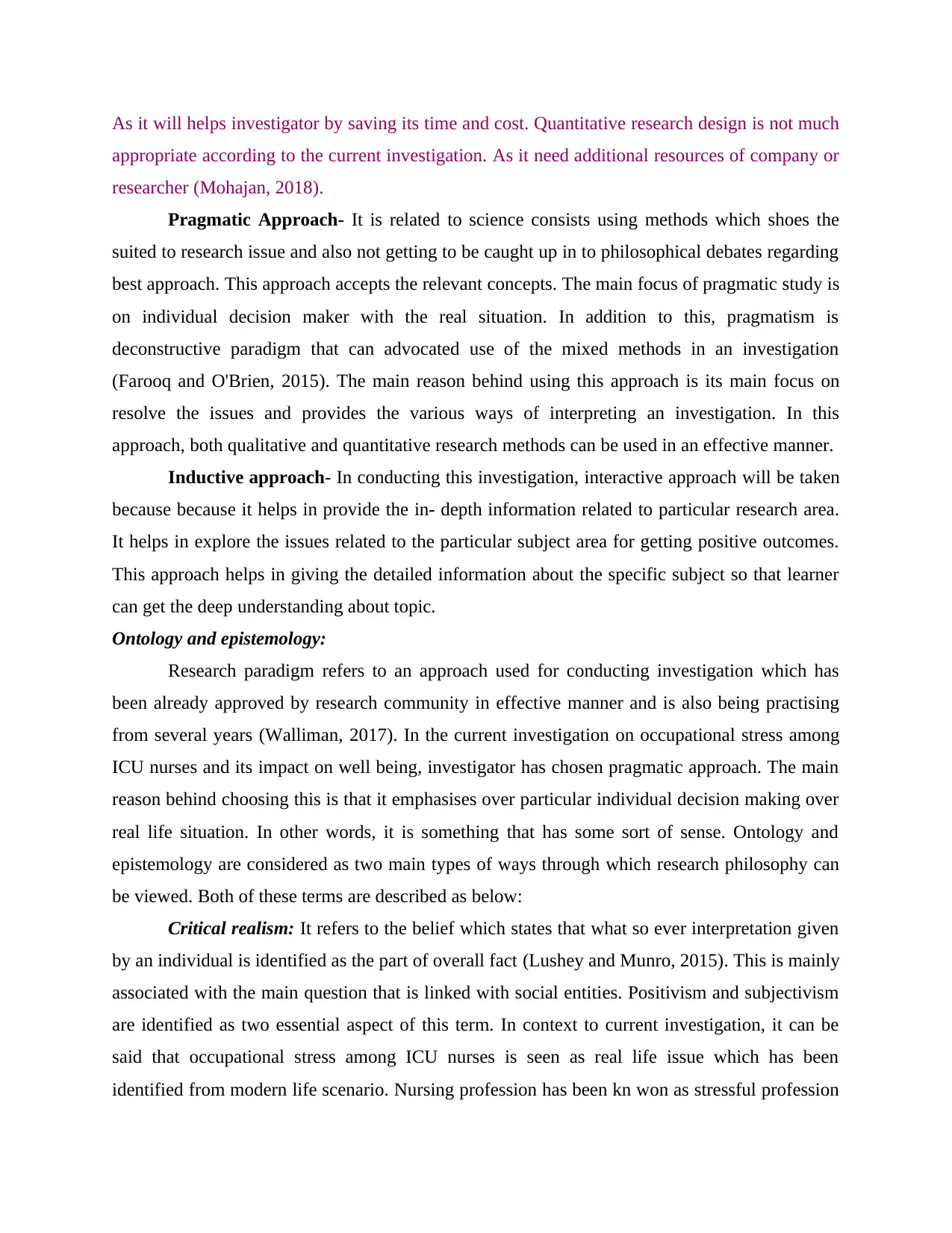
As it will helps investigator by saving its time and cost. Quantitative research design is not much
appropriate according to the current investigation. As it need additional resources of company or
researcher (Mohajan, 2018).
Pragmatic Approach- It is related to science consists using methods which shoes the
suited to research issue and also not getting to be caught up in to philosophical debates regarding
best approach. This approach accepts the relevant concepts. The main focus of pragmatic study is
on individual decision maker with the real situation. In addition to this, pragmatism is
deconstructive paradigm that can advocated use of the mixed methods in an investigation
(Farooq and O'Brien, 2015). The main reason behind using this approach is its main focus on
resolve the issues and provides the various ways of interpreting an investigation. In this
approach, both qualitative and quantitative research methods can be used in an effective manner.
Inductive approach- In conducting this investigation, interactive approach will be taken
because because it helps in provide the in- depth information related to particular research area.
It helps in explore the issues related to the particular subject area for getting positive outcomes.
This approach helps in giving the detailed information about the specific subject so that learner
can get the deep understanding about topic.
Ontology and epistemology:
Research paradigm refers to an approach used for conducting investigation which has
been already approved by research community in effective manner and is also being practising
from several years (Walliman, 2017). In the current investigation on occupational stress among
ICU nurses and its impact on well being, investigator has chosen pragmatic approach. The main
reason behind choosing this is that it emphasises over particular individual decision making over
real life situation. In other words, it is something that has some sort of sense. Ontology and
epistemology are considered as two main types of ways through which research philosophy can
be viewed. Both of these terms are described as below:
Critical realism: It refers to the belief which states that what so ever interpretation given
by an individual is identified as the part of overall fact (Lushey and Munro, 2015). This is mainly
associated with the main question that is linked with social entities. Positivism and subjectivism
are identified as two essential aspect of this term. In context to current investigation, it can be
said that occupational stress among ICU nurses is seen as real life issue which has been
identified from modern life scenario. Nursing profession has been kn won as stressful profession
appropriate according to the current investigation. As it need additional resources of company or
researcher (Mohajan, 2018).
Pragmatic Approach- It is related to science consists using methods which shoes the
suited to research issue and also not getting to be caught up in to philosophical debates regarding
best approach. This approach accepts the relevant concepts. The main focus of pragmatic study is
on individual decision maker with the real situation. In addition to this, pragmatism is
deconstructive paradigm that can advocated use of the mixed methods in an investigation
(Farooq and O'Brien, 2015). The main reason behind using this approach is its main focus on
resolve the issues and provides the various ways of interpreting an investigation. In this
approach, both qualitative and quantitative research methods can be used in an effective manner.
Inductive approach- In conducting this investigation, interactive approach will be taken
because because it helps in provide the in- depth information related to particular research area.
It helps in explore the issues related to the particular subject area for getting positive outcomes.
This approach helps in giving the detailed information about the specific subject so that learner
can get the deep understanding about topic.
Ontology and epistemology:
Research paradigm refers to an approach used for conducting investigation which has
been already approved by research community in effective manner and is also being practising
from several years (Walliman, 2017). In the current investigation on occupational stress among
ICU nurses and its impact on well being, investigator has chosen pragmatic approach. The main
reason behind choosing this is that it emphasises over particular individual decision making over
real life situation. In other words, it is something that has some sort of sense. Ontology and
epistemology are considered as two main types of ways through which research philosophy can
be viewed. Both of these terms are described as below:
Critical realism: It refers to the belief which states that what so ever interpretation given
by an individual is identified as the part of overall fact (Lushey and Munro, 2015). This is mainly
associated with the main question that is linked with social entities. Positivism and subjectivism
are identified as two essential aspect of this term. In context to current investigation, it can be
said that occupational stress among ICU nurses is seen as real life issue which has been
identified from modern life scenario. Nursing profession has been kn won as stressful profession
Paraphrase This Document
Need a fresh take? Get an instant paraphrase of this document with our AI Paraphraser
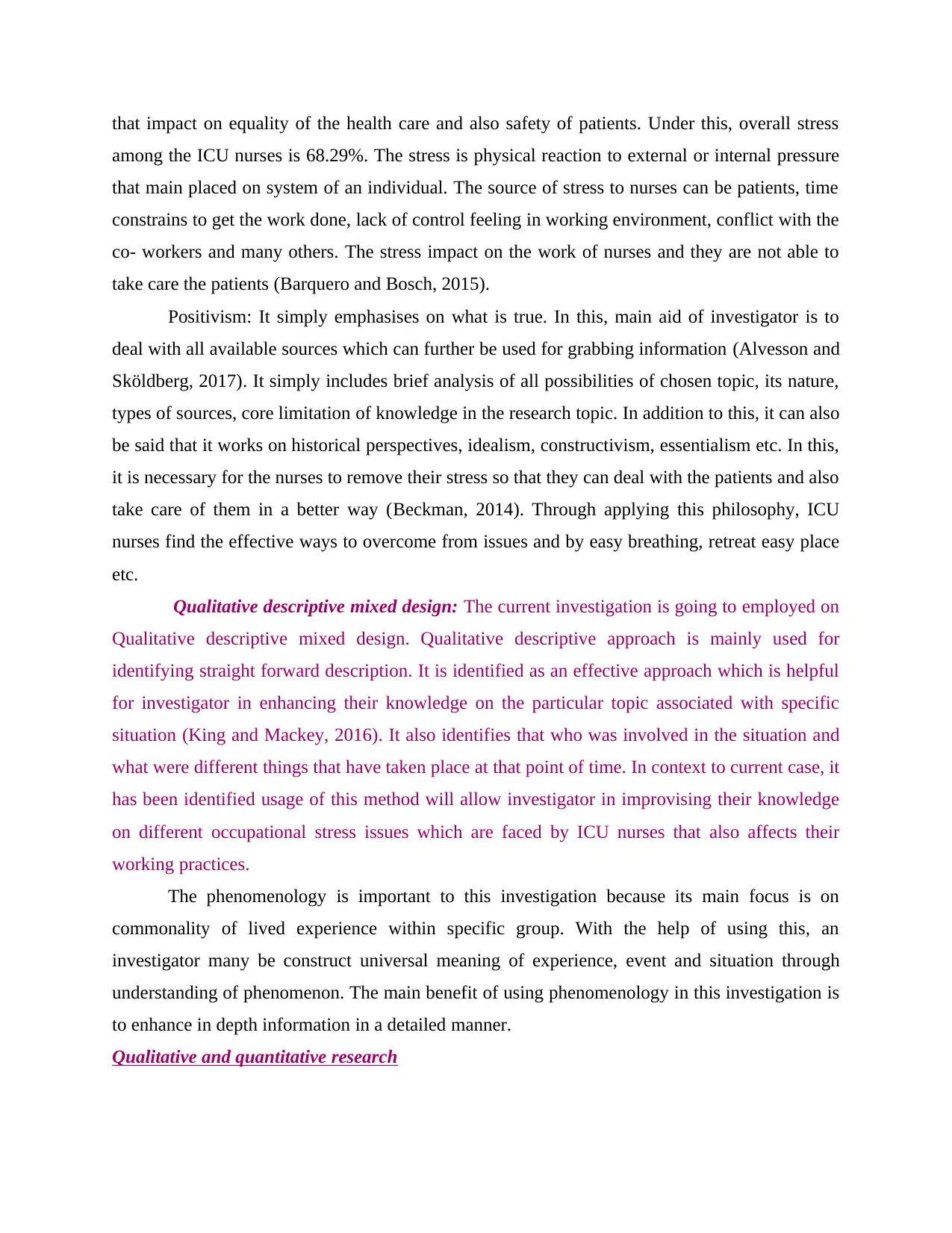
that impact on equality of the health care and also safety of patients. Under this, overall stress
among the ICU nurses is 68.29%. The stress is physical reaction to external or internal pressure
that main placed on system of an individual. The source of stress to nurses can be patients, time
constrains to get the work done, lack of control feeling in working environment, conflict with the
co- workers and many others. The stress impact on the work of nurses and they are not able to
take care the patients (Barquero and Bosch, 2015).
Positivism: It simply emphasises on what is true. In this, main aid of investigator is to
deal with all available sources which can further be used for grabbing information (Alvesson and
Sköldberg, 2017). It simply includes brief analysis of all possibilities of chosen topic, its nature,
types of sources, core limitation of knowledge in the research topic. In addition to this, it can also
be said that it works on historical perspectives, idealism, constructivism, essentialism etc. In this,
it is necessary for the nurses to remove their stress so that they can deal with the patients and also
take care of them in a better way (Beckman, 2014). Through applying this philosophy, ICU
nurses find the effective ways to overcome from issues and by easy breathing, retreat easy place
etc.
Qualitative descriptive mixed design: The current investigation is going to employed on
Qualitative descriptive mixed design. Qualitative descriptive approach is mainly used for
identifying straight forward description. It is identified as an effective approach which is helpful
for investigator in enhancing their knowledge on the particular topic associated with specific
situation (King and Mackey, 2016). It also identifies that who was involved in the situation and
what were different things that have taken place at that point of time. In context to current case, it
has been identified usage of this method will allow investigator in improvising their knowledge
on different occupational stress issues which are faced by ICU nurses that also affects their
working practices.
The phenomenology is important to this investigation because its main focus is on
commonality of lived experience within specific group. With the help of using this, an
investigator many be construct universal meaning of experience, event and situation through
understanding of phenomenon. The main benefit of using phenomenology in this investigation is
to enhance in depth information in a detailed manner.
Qualitative and quantitative research
among the ICU nurses is 68.29%. The stress is physical reaction to external or internal pressure
that main placed on system of an individual. The source of stress to nurses can be patients, time
constrains to get the work done, lack of control feeling in working environment, conflict with the
co- workers and many others. The stress impact on the work of nurses and they are not able to
take care the patients (Barquero and Bosch, 2015).
Positivism: It simply emphasises on what is true. In this, main aid of investigator is to
deal with all available sources which can further be used for grabbing information (Alvesson and
Sköldberg, 2017). It simply includes brief analysis of all possibilities of chosen topic, its nature,
types of sources, core limitation of knowledge in the research topic. In addition to this, it can also
be said that it works on historical perspectives, idealism, constructivism, essentialism etc. In this,
it is necessary for the nurses to remove their stress so that they can deal with the patients and also
take care of them in a better way (Beckman, 2014). Through applying this philosophy, ICU
nurses find the effective ways to overcome from issues and by easy breathing, retreat easy place
etc.
Qualitative descriptive mixed design: The current investigation is going to employed on
Qualitative descriptive mixed design. Qualitative descriptive approach is mainly used for
identifying straight forward description. It is identified as an effective approach which is helpful
for investigator in enhancing their knowledge on the particular topic associated with specific
situation (King and Mackey, 2016). It also identifies that who was involved in the situation and
what were different things that have taken place at that point of time. In context to current case, it
has been identified usage of this method will allow investigator in improvising their knowledge
on different occupational stress issues which are faced by ICU nurses that also affects their
working practices.
The phenomenology is important to this investigation because its main focus is on
commonality of lived experience within specific group. With the help of using this, an
investigator many be construct universal meaning of experience, event and situation through
understanding of phenomenon. The main benefit of using phenomenology in this investigation is
to enhance in depth information in a detailed manner.
Qualitative and quantitative research
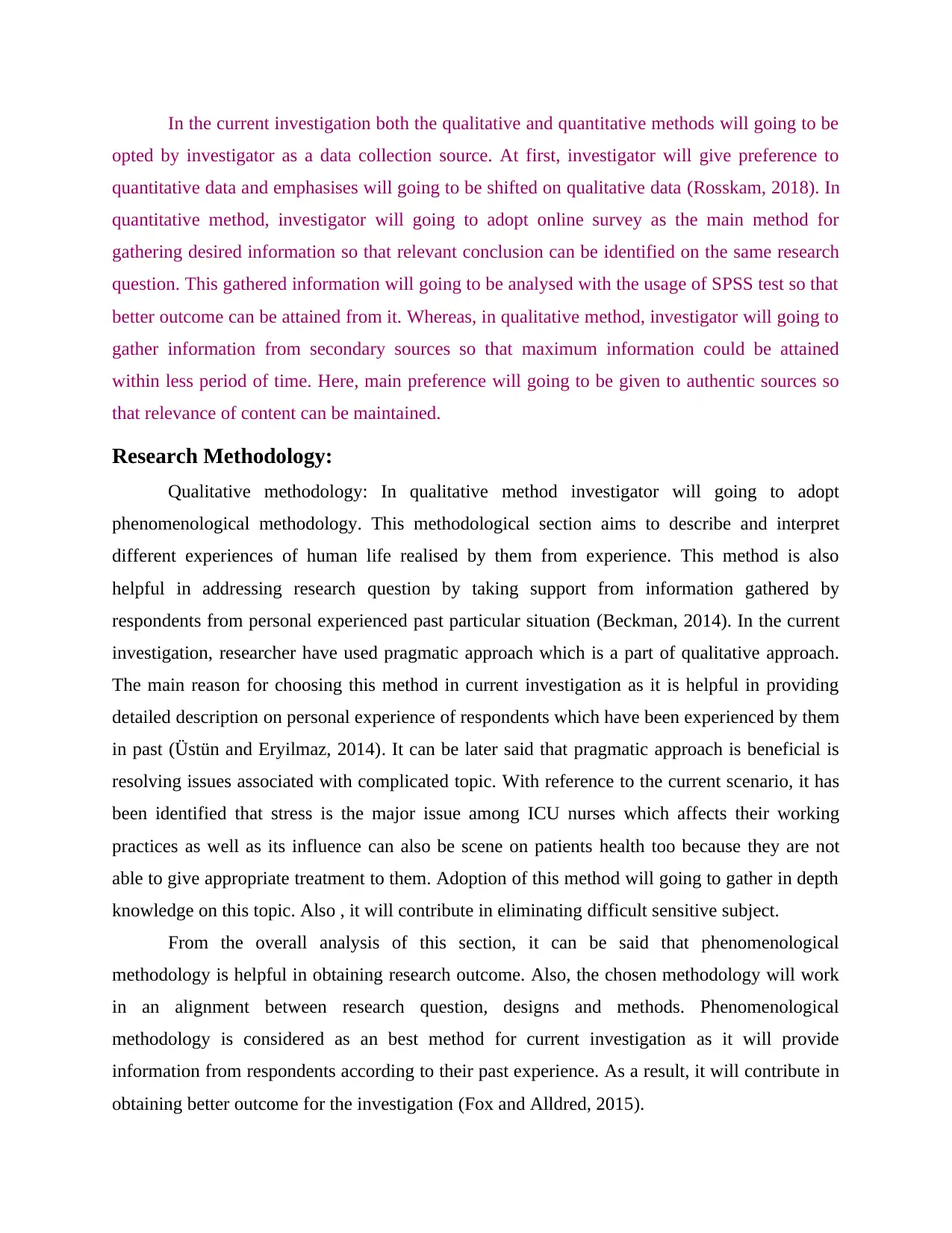
In the current investigation both the qualitative and quantitative methods will going to be
opted by investigator as a data collection source. At first, investigator will give preference to
quantitative data and emphasises will going to be shifted on qualitative data (Rosskam, 2018). In
quantitative method, investigator will going to adopt online survey as the main method for
gathering desired information so that relevant conclusion can be identified on the same research
question. This gathered information will going to be analysed with the usage of SPSS test so that
better outcome can be attained from it. Whereas, in qualitative method, investigator will going to
gather information from secondary sources so that maximum information could be attained
within less period of time. Here, main preference will going to be given to authentic sources so
that relevance of content can be maintained.
Research Methodology:
Qualitative methodology: In qualitative method investigator will going to adopt
phenomenological methodology. This methodological section aims to describe and interpret
different experiences of human life realised by them from experience. This method is also
helpful in addressing research question by taking support from information gathered by
respondents from personal experienced past particular situation (Beckman, 2014). In the current
investigation, researcher have used pragmatic approach which is a part of qualitative approach.
The main reason for choosing this method in current investigation as it is helpful in providing
detailed description on personal experience of respondents which have been experienced by them
in past (Üstün and Eryilmaz, 2014). It can be later said that pragmatic approach is beneficial is
resolving issues associated with complicated topic. With reference to the current scenario, it has
been identified that stress is the major issue among ICU nurses which affects their working
practices as well as its influence can also be scene on patients health too because they are not
able to give appropriate treatment to them. Adoption of this method will going to gather in depth
knowledge on this topic. Also , it will contribute in eliminating difficult sensitive subject.
From the overall analysis of this section, it can be said that phenomenological
methodology is helpful in obtaining research outcome. Also, the chosen methodology will work
in an alignment between research question, designs and methods. Phenomenological
methodology is considered as an best method for current investigation as it will provide
information from respondents according to their past experience. As a result, it will contribute in
obtaining better outcome for the investigation (Fox and Alldred, 2015).
opted by investigator as a data collection source. At first, investigator will give preference to
quantitative data and emphasises will going to be shifted on qualitative data (Rosskam, 2018). In
quantitative method, investigator will going to adopt online survey as the main method for
gathering desired information so that relevant conclusion can be identified on the same research
question. This gathered information will going to be analysed with the usage of SPSS test so that
better outcome can be attained from it. Whereas, in qualitative method, investigator will going to
gather information from secondary sources so that maximum information could be attained
within less period of time. Here, main preference will going to be given to authentic sources so
that relevance of content can be maintained.
Research Methodology:
Qualitative methodology: In qualitative method investigator will going to adopt
phenomenological methodology. This methodological section aims to describe and interpret
different experiences of human life realised by them from experience. This method is also
helpful in addressing research question by taking support from information gathered by
respondents from personal experienced past particular situation (Beckman, 2014). In the current
investigation, researcher have used pragmatic approach which is a part of qualitative approach.
The main reason for choosing this method in current investigation as it is helpful in providing
detailed description on personal experience of respondents which have been experienced by them
in past (Üstün and Eryilmaz, 2014). It can be later said that pragmatic approach is beneficial is
resolving issues associated with complicated topic. With reference to the current scenario, it has
been identified that stress is the major issue among ICU nurses which affects their working
practices as well as its influence can also be scene on patients health too because they are not
able to give appropriate treatment to them. Adoption of this method will going to gather in depth
knowledge on this topic. Also , it will contribute in eliminating difficult sensitive subject.
From the overall analysis of this section, it can be said that phenomenological
methodology is helpful in obtaining research outcome. Also, the chosen methodology will work
in an alignment between research question, designs and methods. Phenomenological
methodology is considered as an best method for current investigation as it will provide
information from respondents according to their past experience. As a result, it will contribute in
obtaining better outcome for the investigation (Fox and Alldred, 2015).
⊘ This is a preview!⊘
Do you want full access?
Subscribe today to unlock all pages.

Trusted by 1+ million students worldwide
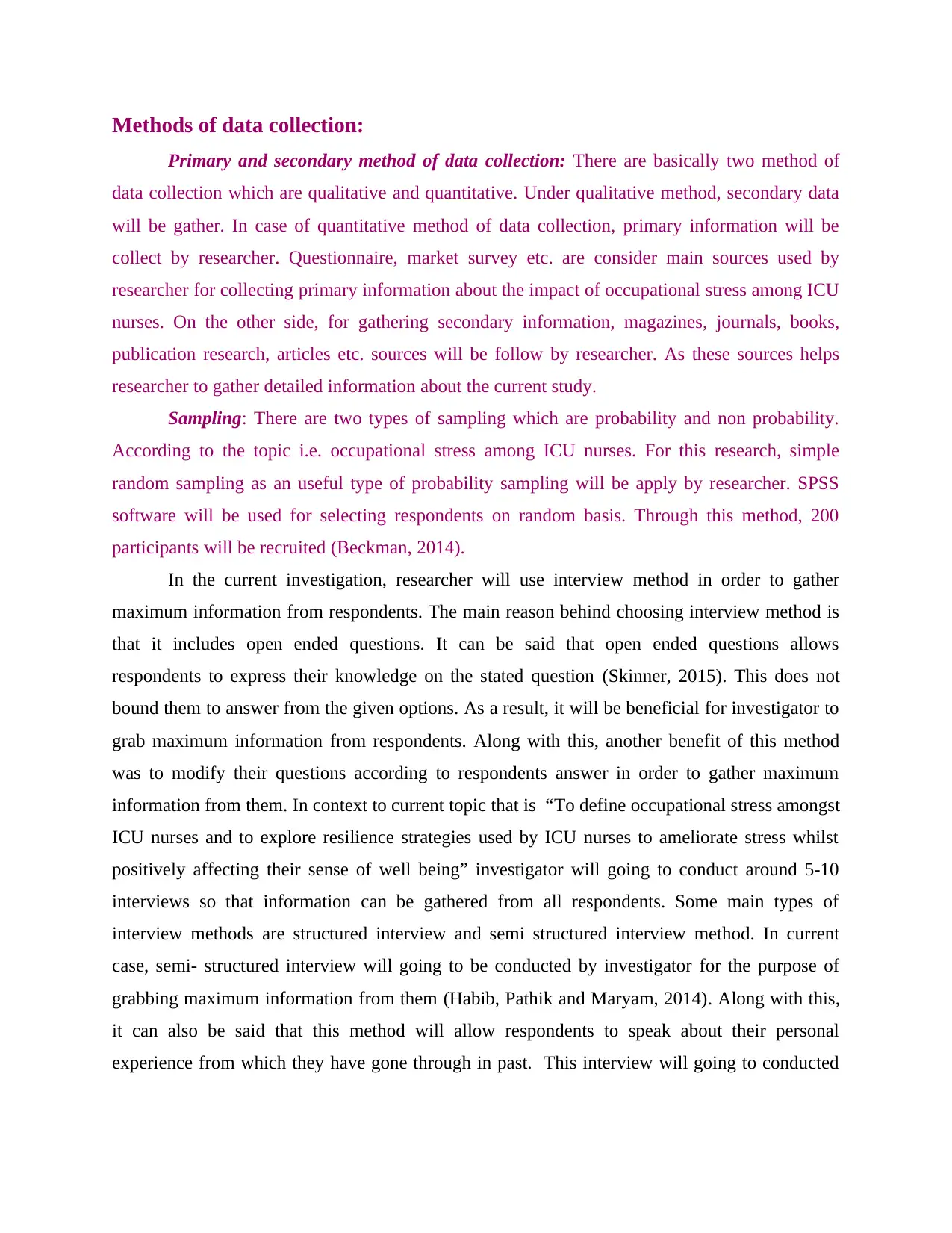
Methods of data collection:
Primary and secondary method of data collection: There are basically two method of
data collection which are qualitative and quantitative. Under qualitative method, secondary data
will be gather. In case of quantitative method of data collection, primary information will be
collect by researcher. Questionnaire, market survey etc. are consider main sources used by
researcher for collecting primary information about the impact of occupational stress among ICU
nurses. On the other side, for gathering secondary information, magazines, journals, books,
publication research, articles etc. sources will be follow by researcher. As these sources helps
researcher to gather detailed information about the current study.
Sampling: There are two types of sampling which are probability and non probability.
According to the topic i.e. occupational stress among ICU nurses. For this research, simple
random sampling as an useful type of probability sampling will be apply by researcher. SPSS
software will be used for selecting respondents on random basis. Through this method, 200
participants will be recruited (Beckman, 2014).
In the current investigation, researcher will use interview method in order to gather
maximum information from respondents. The main reason behind choosing interview method is
that it includes open ended questions. It can be said that open ended questions allows
respondents to express their knowledge on the stated question (Skinner, 2015). This does not
bound them to answer from the given options. As a result, it will be beneficial for investigator to
grab maximum information from respondents. Along with this, another benefit of this method
was to modify their questions according to respondents answer in order to gather maximum
information from them. In context to current topic that is “To define occupational stress amongst
ICU nurses and to explore resilience strategies used by ICU nurses to ameliorate stress whilst
positively affecting their sense of well being” investigator will going to conduct around 5-10
interviews so that information can be gathered from all respondents. Some main types of
interview methods are structured interview and semi structured interview method. In current
case, semi- structured interview will going to be conducted by investigator for the purpose of
grabbing maximum information from them (Habib, Pathik and Maryam, 2014). Along with this,
it can also be said that this method will allow respondents to speak about their personal
experience from which they have gone through in past. This interview will going to conducted
Primary and secondary method of data collection: There are basically two method of
data collection which are qualitative and quantitative. Under qualitative method, secondary data
will be gather. In case of quantitative method of data collection, primary information will be
collect by researcher. Questionnaire, market survey etc. are consider main sources used by
researcher for collecting primary information about the impact of occupational stress among ICU
nurses. On the other side, for gathering secondary information, magazines, journals, books,
publication research, articles etc. sources will be follow by researcher. As these sources helps
researcher to gather detailed information about the current study.
Sampling: There are two types of sampling which are probability and non probability.
According to the topic i.e. occupational stress among ICU nurses. For this research, simple
random sampling as an useful type of probability sampling will be apply by researcher. SPSS
software will be used for selecting respondents on random basis. Through this method, 200
participants will be recruited (Beckman, 2014).
In the current investigation, researcher will use interview method in order to gather
maximum information from respondents. The main reason behind choosing interview method is
that it includes open ended questions. It can be said that open ended questions allows
respondents to express their knowledge on the stated question (Skinner, 2015). This does not
bound them to answer from the given options. As a result, it will be beneficial for investigator to
grab maximum information from respondents. Along with this, another benefit of this method
was to modify their questions according to respondents answer in order to gather maximum
information from them. In context to current topic that is “To define occupational stress amongst
ICU nurses and to explore resilience strategies used by ICU nurses to ameliorate stress whilst
positively affecting their sense of well being” investigator will going to conduct around 5-10
interviews so that information can be gathered from all respondents. Some main types of
interview methods are structured interview and semi structured interview method. In current
case, semi- structured interview will going to be conducted by investigator for the purpose of
grabbing maximum information from them (Habib, Pathik and Maryam, 2014). Along with this,
it can also be said that this method will allow respondents to speak about their personal
experience from which they have gone through in past. This interview will going to conducted
Paraphrase This Document
Need a fresh take? Get an instant paraphrase of this document with our AI Paraphraser
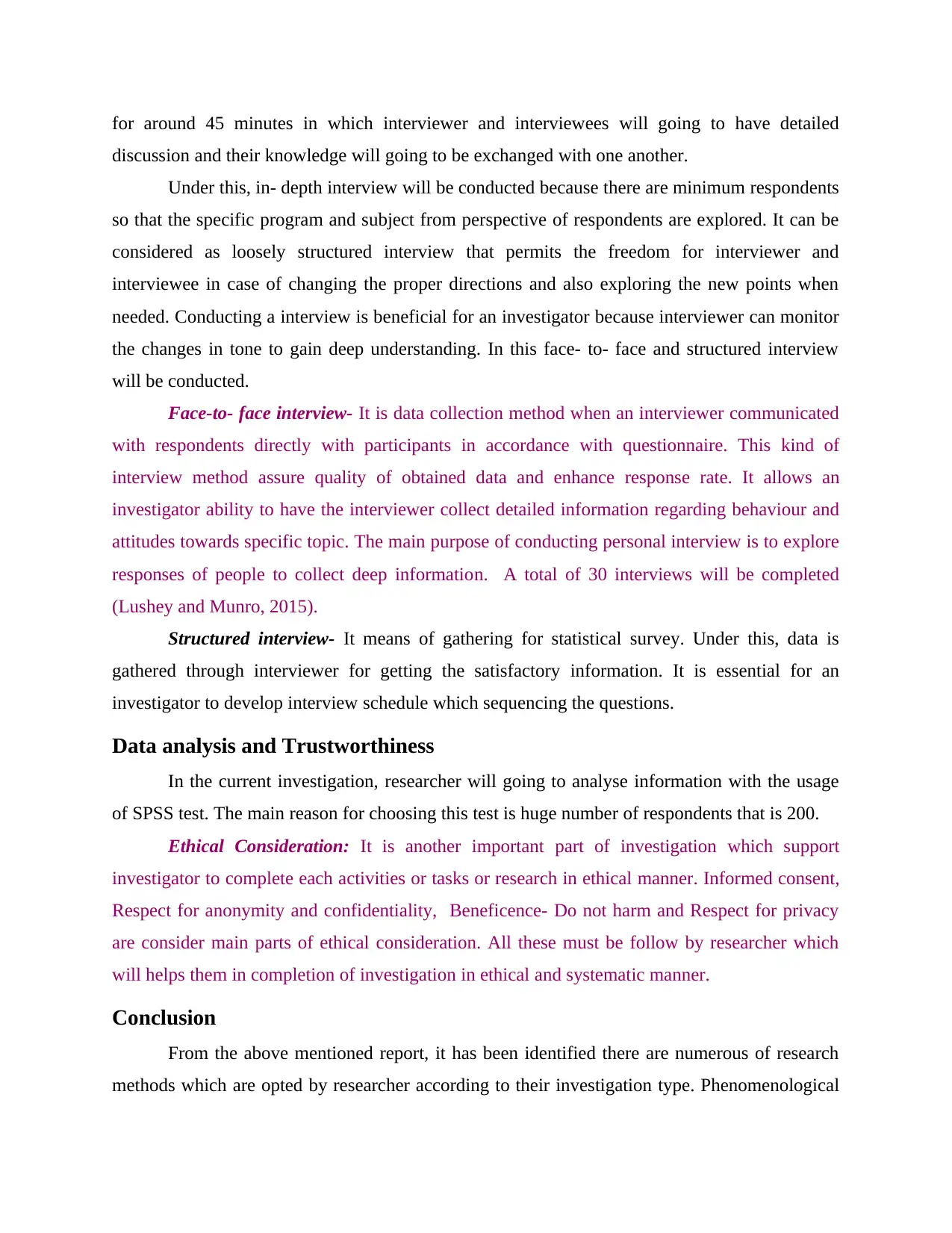
for around 45 minutes in which interviewer and interviewees will going to have detailed
discussion and their knowledge will going to be exchanged with one another.
Under this, in- depth interview will be conducted because there are minimum respondents
so that the specific program and subject from perspective of respondents are explored. It can be
considered as loosely structured interview that permits the freedom for interviewer and
interviewee in case of changing the proper directions and also exploring the new points when
needed. Conducting a interview is beneficial for an investigator because interviewer can monitor
the changes in tone to gain deep understanding. In this face- to- face and structured interview
will be conducted.
Face-to- face interview- It is data collection method when an interviewer communicated
with respondents directly with participants in accordance with questionnaire. This kind of
interview method assure quality of obtained data and enhance response rate. It allows an
investigator ability to have the interviewer collect detailed information regarding behaviour and
attitudes towards specific topic. The main purpose of conducting personal interview is to explore
responses of people to collect deep information. A total of 30 interviews will be completed
(Lushey and Munro, 2015).
Structured interview- It means of gathering for statistical survey. Under this, data is
gathered through interviewer for getting the satisfactory information. It is essential for an
investigator to develop interview schedule which sequencing the questions.
Data analysis and Trustworthiness
In the current investigation, researcher will going to analyse information with the usage
of SPSS test. The main reason for choosing this test is huge number of respondents that is 200.
Ethical Consideration: It is another important part of investigation which support
investigator to complete each activities or tasks or research in ethical manner. Informed consent,
Respect for anonymity and confidentiality, Beneficence- Do not harm and Respect for privacy
are consider main parts of ethical consideration. All these must be follow by researcher which
will helps them in completion of investigation in ethical and systematic manner.
Conclusion
From the above mentioned report, it has been identified there are numerous of research
methods which are opted by researcher according to their investigation type. Phenomenological
discussion and their knowledge will going to be exchanged with one another.
Under this, in- depth interview will be conducted because there are minimum respondents
so that the specific program and subject from perspective of respondents are explored. It can be
considered as loosely structured interview that permits the freedom for interviewer and
interviewee in case of changing the proper directions and also exploring the new points when
needed. Conducting a interview is beneficial for an investigator because interviewer can monitor
the changes in tone to gain deep understanding. In this face- to- face and structured interview
will be conducted.
Face-to- face interview- It is data collection method when an interviewer communicated
with respondents directly with participants in accordance with questionnaire. This kind of
interview method assure quality of obtained data and enhance response rate. It allows an
investigator ability to have the interviewer collect detailed information regarding behaviour and
attitudes towards specific topic. The main purpose of conducting personal interview is to explore
responses of people to collect deep information. A total of 30 interviews will be completed
(Lushey and Munro, 2015).
Structured interview- It means of gathering for statistical survey. Under this, data is
gathered through interviewer for getting the satisfactory information. It is essential for an
investigator to develop interview schedule which sequencing the questions.
Data analysis and Trustworthiness
In the current investigation, researcher will going to analyse information with the usage
of SPSS test. The main reason for choosing this test is huge number of respondents that is 200.
Ethical Consideration: It is another important part of investigation which support
investigator to complete each activities or tasks or research in ethical manner. Informed consent,
Respect for anonymity and confidentiality, Beneficence- Do not harm and Respect for privacy
are consider main parts of ethical consideration. All these must be follow by researcher which
will helps them in completion of investigation in ethical and systematic manner.
Conclusion
From the above mentioned report, it has been identified there are numerous of research
methods which are opted by researcher according to their investigation type. Phenomenological
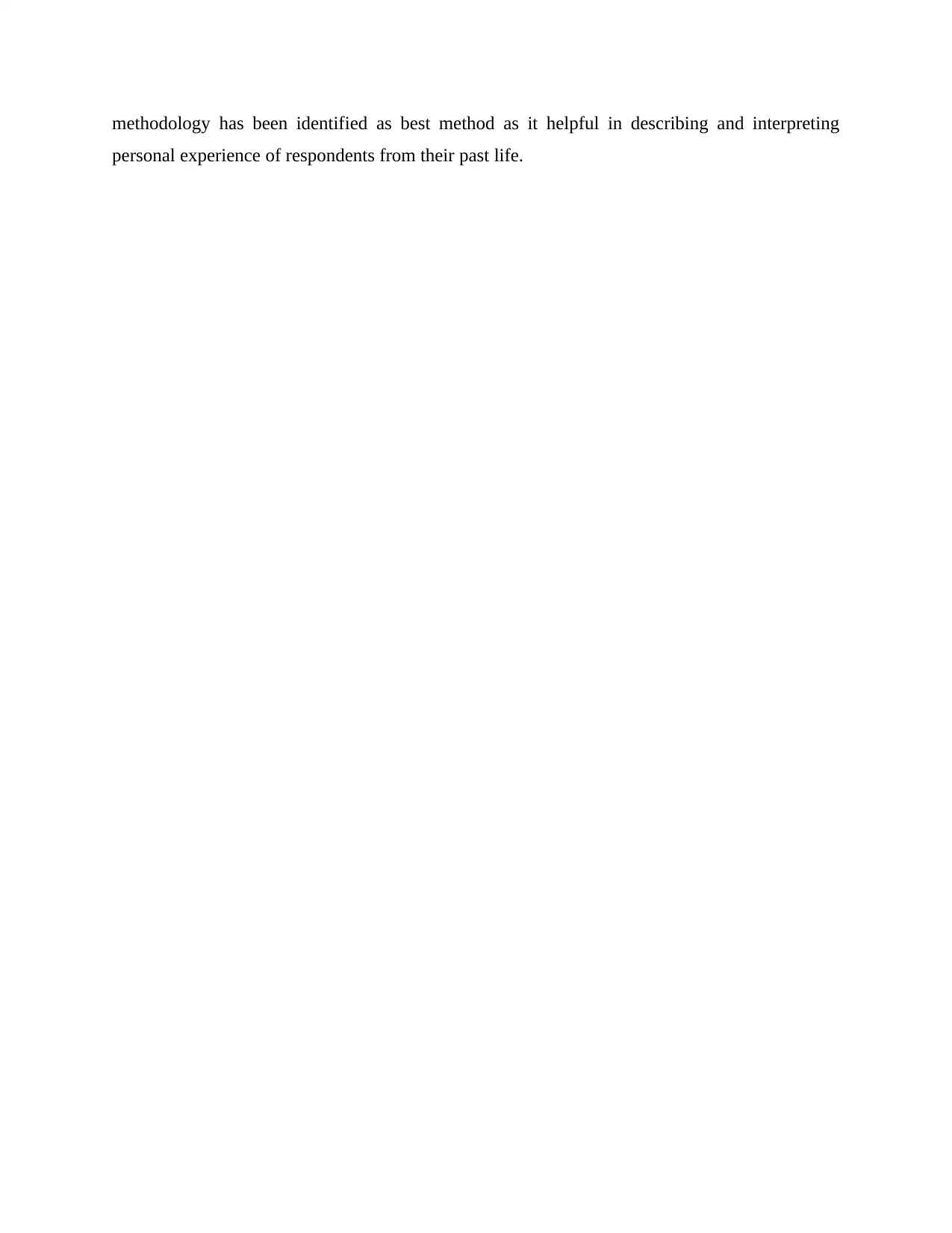
methodology has been identified as best method as it helpful in describing and interpreting
personal experience of respondents from their past life.
personal experience of respondents from their past life.
⊘ This is a preview!⊘
Do you want full access?
Subscribe today to unlock all pages.

Trusted by 1+ million students worldwide
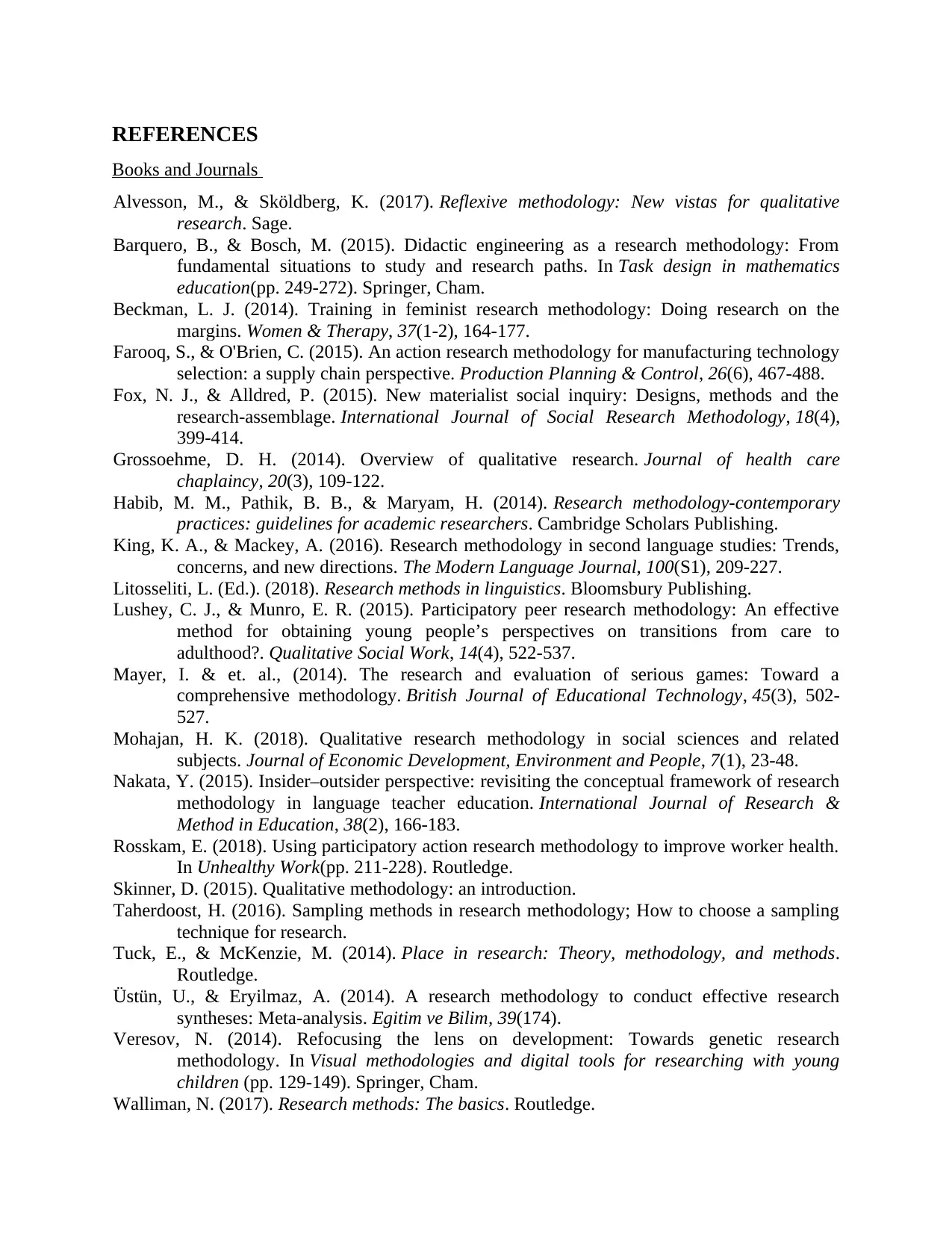
REFERENCES
Books and Journals
Alvesson, M., & Sköldberg, K. (2017). Reflexive methodology: New vistas for qualitative
research. Sage.
Barquero, B., & Bosch, M. (2015). Didactic engineering as a research methodology: From
fundamental situations to study and research paths. In Task design in mathematics
education(pp. 249-272). Springer, Cham.
Beckman, L. J. (2014). Training in feminist research methodology: Doing research on the
margins. Women & Therapy, 37(1-2), 164-177.
Farooq, S., & O'Brien, C. (2015). An action research methodology for manufacturing technology
selection: a supply chain perspective. Production Planning & Control, 26(6), 467-488.
Fox, N. J., & Alldred, P. (2015). New materialist social inquiry: Designs, methods and the
research-assemblage. International Journal of Social Research Methodology, 18(4),
399-414.
Grossoehme, D. H. (2014). Overview of qualitative research. Journal of health care
chaplaincy, 20(3), 109-122.
Habib, M. M., Pathik, B. B., & Maryam, H. (2014). Research methodology-contemporary
practices: guidelines for academic researchers. Cambridge Scholars Publishing.
King, K. A., & Mackey, A. (2016). Research methodology in second language studies: Trends,
concerns, and new directions. The Modern Language Journal, 100(S1), 209-227.
Litosseliti, L. (Ed.). (2018). Research methods in linguistics. Bloomsbury Publishing.
Lushey, C. J., & Munro, E. R. (2015). Participatory peer research methodology: An effective
method for obtaining young people’s perspectives on transitions from care to
adulthood?. Qualitative Social Work, 14(4), 522-537.
Mayer, I. & et. al., (2014). The research and evaluation of serious games: Toward a
comprehensive methodology. British Journal of Educational Technology, 45(3), 502-
527.
Mohajan, H. K. (2018). Qualitative research methodology in social sciences and related
subjects. Journal of Economic Development, Environment and People, 7(1), 23-48.
Nakata, Y. (2015). Insider–outsider perspective: revisiting the conceptual framework of research
methodology in language teacher education. International Journal of Research &
Method in Education, 38(2), 166-183.
Rosskam, E. (2018). Using participatory action research methodology to improve worker health.
In Unhealthy Work(pp. 211-228). Routledge.
Skinner, D. (2015). Qualitative methodology: an introduction.
Taherdoost, H. (2016). Sampling methods in research methodology; How to choose a sampling
technique for research.
Tuck, E., & McKenzie, M. (2014). Place in research: Theory, methodology, and methods.
Routledge.
Üstün, U., & Eryilmaz, A. (2014). A research methodology to conduct effective research
syntheses: Meta-analysis. Egitim ve Bilim, 39(174).
Veresov, N. (2014). Refocusing the lens on development: Towards genetic research
methodology. In Visual methodologies and digital tools for researching with young
children (pp. 129-149). Springer, Cham.
Walliman, N. (2017). Research methods: The basics. Routledge.
Books and Journals
Alvesson, M., & Sköldberg, K. (2017). Reflexive methodology: New vistas for qualitative
research. Sage.
Barquero, B., & Bosch, M. (2015). Didactic engineering as a research methodology: From
fundamental situations to study and research paths. In Task design in mathematics
education(pp. 249-272). Springer, Cham.
Beckman, L. J. (2014). Training in feminist research methodology: Doing research on the
margins. Women & Therapy, 37(1-2), 164-177.
Farooq, S., & O'Brien, C. (2015). An action research methodology for manufacturing technology
selection: a supply chain perspective. Production Planning & Control, 26(6), 467-488.
Fox, N. J., & Alldred, P. (2015). New materialist social inquiry: Designs, methods and the
research-assemblage. International Journal of Social Research Methodology, 18(4),
399-414.
Grossoehme, D. H. (2014). Overview of qualitative research. Journal of health care
chaplaincy, 20(3), 109-122.
Habib, M. M., Pathik, B. B., & Maryam, H. (2014). Research methodology-contemporary
practices: guidelines for academic researchers. Cambridge Scholars Publishing.
King, K. A., & Mackey, A. (2016). Research methodology in second language studies: Trends,
concerns, and new directions. The Modern Language Journal, 100(S1), 209-227.
Litosseliti, L. (Ed.). (2018). Research methods in linguistics. Bloomsbury Publishing.
Lushey, C. J., & Munro, E. R. (2015). Participatory peer research methodology: An effective
method for obtaining young people’s perspectives on transitions from care to
adulthood?. Qualitative Social Work, 14(4), 522-537.
Mayer, I. & et. al., (2014). The research and evaluation of serious games: Toward a
comprehensive methodology. British Journal of Educational Technology, 45(3), 502-
527.
Mohajan, H. K. (2018). Qualitative research methodology in social sciences and related
subjects. Journal of Economic Development, Environment and People, 7(1), 23-48.
Nakata, Y. (2015). Insider–outsider perspective: revisiting the conceptual framework of research
methodology in language teacher education. International Journal of Research &
Method in Education, 38(2), 166-183.
Rosskam, E. (2018). Using participatory action research methodology to improve worker health.
In Unhealthy Work(pp. 211-228). Routledge.
Skinner, D. (2015). Qualitative methodology: an introduction.
Taherdoost, H. (2016). Sampling methods in research methodology; How to choose a sampling
technique for research.
Tuck, E., & McKenzie, M. (2014). Place in research: Theory, methodology, and methods.
Routledge.
Üstün, U., & Eryilmaz, A. (2014). A research methodology to conduct effective research
syntheses: Meta-analysis. Egitim ve Bilim, 39(174).
Veresov, N. (2014). Refocusing the lens on development: Towards genetic research
methodology. In Visual methodologies and digital tools for researching with young
children (pp. 129-149). Springer, Cham.
Walliman, N. (2017). Research methods: The basics. Routledge.
Paraphrase This Document
Need a fresh take? Get an instant paraphrase of this document with our AI Paraphraser
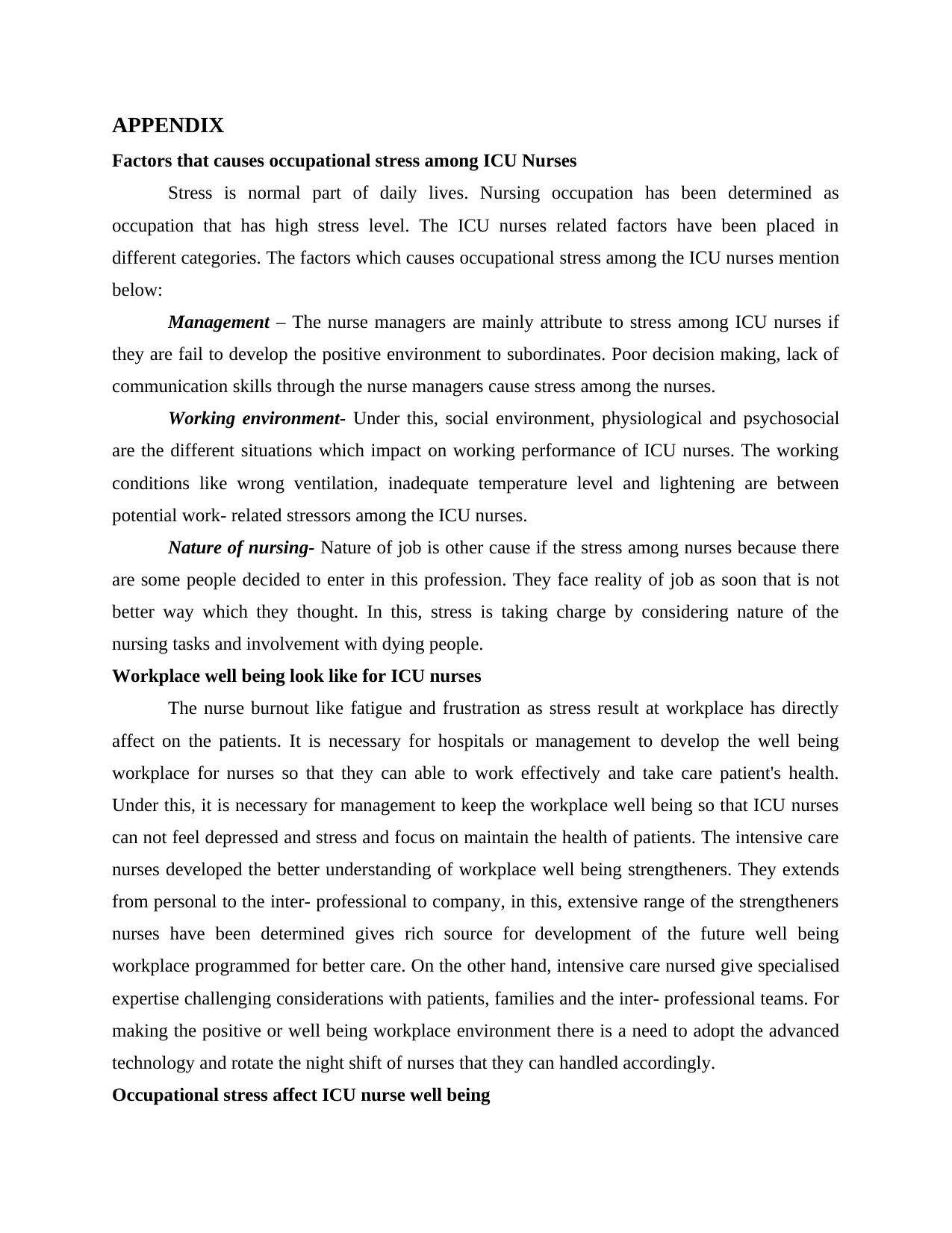
APPENDIX
Factors that causes occupational stress among ICU Nurses
Stress is normal part of daily lives. Nursing occupation has been determined as
occupation that has high stress level. The ICU nurses related factors have been placed in
different categories. The factors which causes occupational stress among the ICU nurses mention
below:
Management – The nurse managers are mainly attribute to stress among ICU nurses if
they are fail to develop the positive environment to subordinates. Poor decision making, lack of
communication skills through the nurse managers cause stress among the nurses.
Working environment- Under this, social environment, physiological and psychosocial
are the different situations which impact on working performance of ICU nurses. The working
conditions like wrong ventilation, inadequate temperature level and lightening are between
potential work- related stressors among the ICU nurses.
Nature of nursing- Nature of job is other cause if the stress among nurses because there
are some people decided to enter in this profession. They face reality of job as soon that is not
better way which they thought. In this, stress is taking charge by considering nature of the
nursing tasks and involvement with dying people.
Workplace well being look like for ICU nurses
The nurse burnout like fatigue and frustration as stress result at workplace has directly
affect on the patients. It is necessary for hospitals or management to develop the well being
workplace for nurses so that they can able to work effectively and take care patient's health.
Under this, it is necessary for management to keep the workplace well being so that ICU nurses
can not feel depressed and stress and focus on maintain the health of patients. The intensive care
nurses developed the better understanding of workplace well being strengtheners. They extends
from personal to the inter- professional to company, in this, extensive range of the strengtheners
nurses have been determined gives rich source for development of the future well being
workplace programmed for better care. On the other hand, intensive care nursed give specialised
expertise challenging considerations with patients, families and the inter- professional teams. For
making the positive or well being workplace environment there is a need to adopt the advanced
technology and rotate the night shift of nurses that they can handled accordingly.
Occupational stress affect ICU nurse well being
Factors that causes occupational stress among ICU Nurses
Stress is normal part of daily lives. Nursing occupation has been determined as
occupation that has high stress level. The ICU nurses related factors have been placed in
different categories. The factors which causes occupational stress among the ICU nurses mention
below:
Management – The nurse managers are mainly attribute to stress among ICU nurses if
they are fail to develop the positive environment to subordinates. Poor decision making, lack of
communication skills through the nurse managers cause stress among the nurses.
Working environment- Under this, social environment, physiological and psychosocial
are the different situations which impact on working performance of ICU nurses. The working
conditions like wrong ventilation, inadequate temperature level and lightening are between
potential work- related stressors among the ICU nurses.
Nature of nursing- Nature of job is other cause if the stress among nurses because there
are some people decided to enter in this profession. They face reality of job as soon that is not
better way which they thought. In this, stress is taking charge by considering nature of the
nursing tasks and involvement with dying people.
Workplace well being look like for ICU nurses
The nurse burnout like fatigue and frustration as stress result at workplace has directly
affect on the patients. It is necessary for hospitals or management to develop the well being
workplace for nurses so that they can able to work effectively and take care patient's health.
Under this, it is necessary for management to keep the workplace well being so that ICU nurses
can not feel depressed and stress and focus on maintain the health of patients. The intensive care
nurses developed the better understanding of workplace well being strengtheners. They extends
from personal to the inter- professional to company, in this, extensive range of the strengtheners
nurses have been determined gives rich source for development of the future well being
workplace programmed for better care. On the other hand, intensive care nursed give specialised
expertise challenging considerations with patients, families and the inter- professional teams. For
making the positive or well being workplace environment there is a need to adopt the advanced
technology and rotate the night shift of nurses that they can handled accordingly.
Occupational stress affect ICU nurse well being
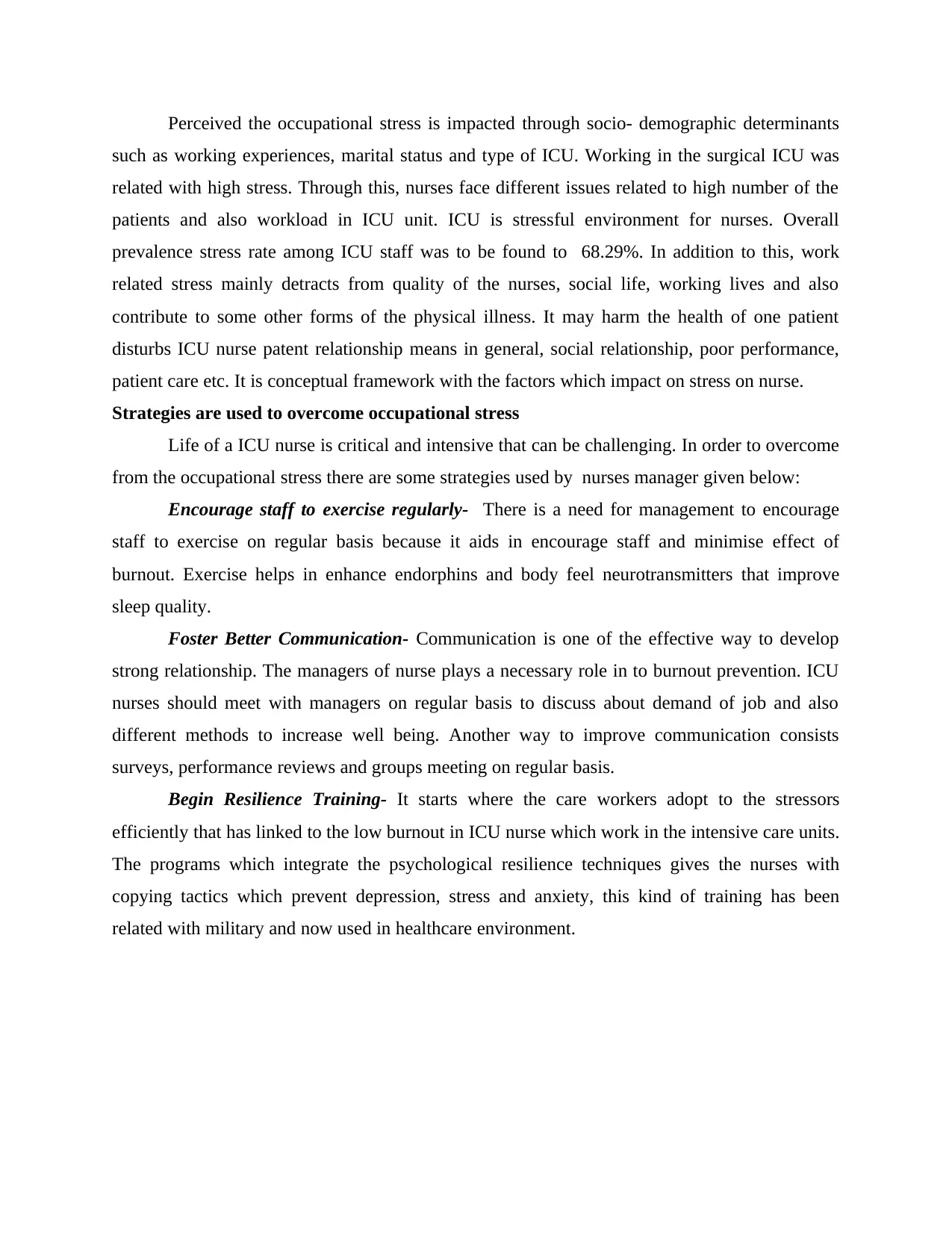
Perceived the occupational stress is impacted through socio- demographic determinants
such as working experiences, marital status and type of ICU. Working in the surgical ICU was
related with high stress. Through this, nurses face different issues related to high number of the
patients and also workload in ICU unit. ICU is stressful environment for nurses. Overall
prevalence stress rate among ICU staff was to be found to 68.29%. In addition to this, work
related stress mainly detracts from quality of the nurses, social life, working lives and also
contribute to some other forms of the physical illness. It may harm the health of one patient
disturbs ICU nurse patent relationship means in general, social relationship, poor performance,
patient care etc. It is conceptual framework with the factors which impact on stress on nurse.
Strategies are used to overcome occupational stress
Life of a ICU nurse is critical and intensive that can be challenging. In order to overcome
from the occupational stress there are some strategies used by nurses manager given below:
Encourage staff to exercise regularly- There is a need for management to encourage
staff to exercise on regular basis because it aids in encourage staff and minimise effect of
burnout. Exercise helps in enhance endorphins and body feel neurotransmitters that improve
sleep quality.
Foster Better Communication- Communication is one of the effective way to develop
strong relationship. The managers of nurse plays a necessary role in to burnout prevention. ICU
nurses should meet with managers on regular basis to discuss about demand of job and also
different methods to increase well being. Another way to improve communication consists
surveys, performance reviews and groups meeting on regular basis.
Begin Resilience Training- It starts where the care workers adopt to the stressors
efficiently that has linked to the low burnout in ICU nurse which work in the intensive care units.
The programs which integrate the psychological resilience techniques gives the nurses with
copying tactics which prevent depression, stress and anxiety, this kind of training has been
related with military and now used in healthcare environment.
such as working experiences, marital status and type of ICU. Working in the surgical ICU was
related with high stress. Through this, nurses face different issues related to high number of the
patients and also workload in ICU unit. ICU is stressful environment for nurses. Overall
prevalence stress rate among ICU staff was to be found to 68.29%. In addition to this, work
related stress mainly detracts from quality of the nurses, social life, working lives and also
contribute to some other forms of the physical illness. It may harm the health of one patient
disturbs ICU nurse patent relationship means in general, social relationship, poor performance,
patient care etc. It is conceptual framework with the factors which impact on stress on nurse.
Strategies are used to overcome occupational stress
Life of a ICU nurse is critical and intensive that can be challenging. In order to overcome
from the occupational stress there are some strategies used by nurses manager given below:
Encourage staff to exercise regularly- There is a need for management to encourage
staff to exercise on regular basis because it aids in encourage staff and minimise effect of
burnout. Exercise helps in enhance endorphins and body feel neurotransmitters that improve
sleep quality.
Foster Better Communication- Communication is one of the effective way to develop
strong relationship. The managers of nurse plays a necessary role in to burnout prevention. ICU
nurses should meet with managers on regular basis to discuss about demand of job and also
different methods to increase well being. Another way to improve communication consists
surveys, performance reviews and groups meeting on regular basis.
Begin Resilience Training- It starts where the care workers adopt to the stressors
efficiently that has linked to the low burnout in ICU nurse which work in the intensive care units.
The programs which integrate the psychological resilience techniques gives the nurses with
copying tactics which prevent depression, stress and anxiety, this kind of training has been
related with military and now used in healthcare environment.
⊘ This is a preview!⊘
Do you want full access?
Subscribe today to unlock all pages.

Trusted by 1+ million students worldwide
1 out of 12
Related Documents
Your All-in-One AI-Powered Toolkit for Academic Success.
+13062052269
info@desklib.com
Available 24*7 on WhatsApp / Email
![[object Object]](/_next/static/media/star-bottom.7253800d.svg)
Unlock your academic potential
Copyright © 2020–2025 A2Z Services. All Rights Reserved. Developed and managed by ZUCOL.





